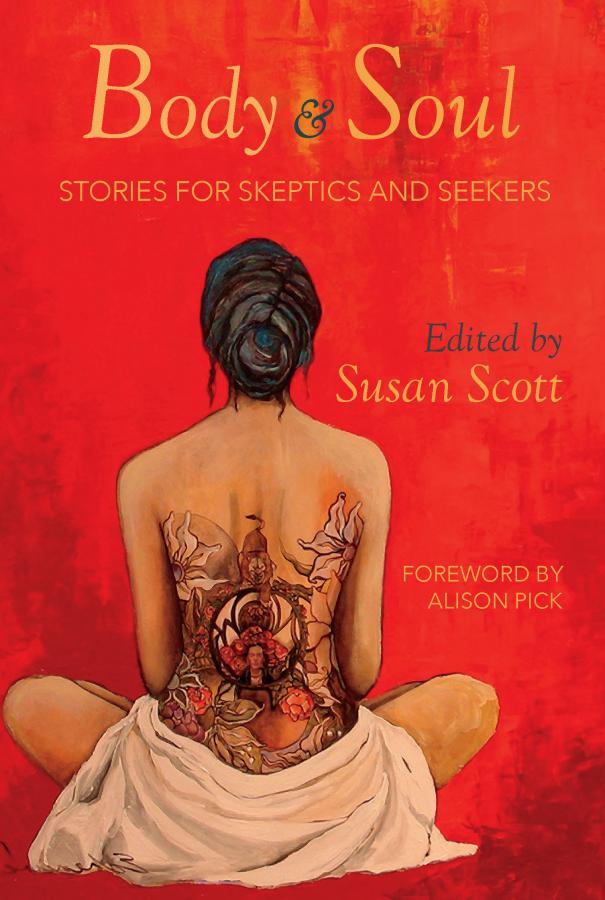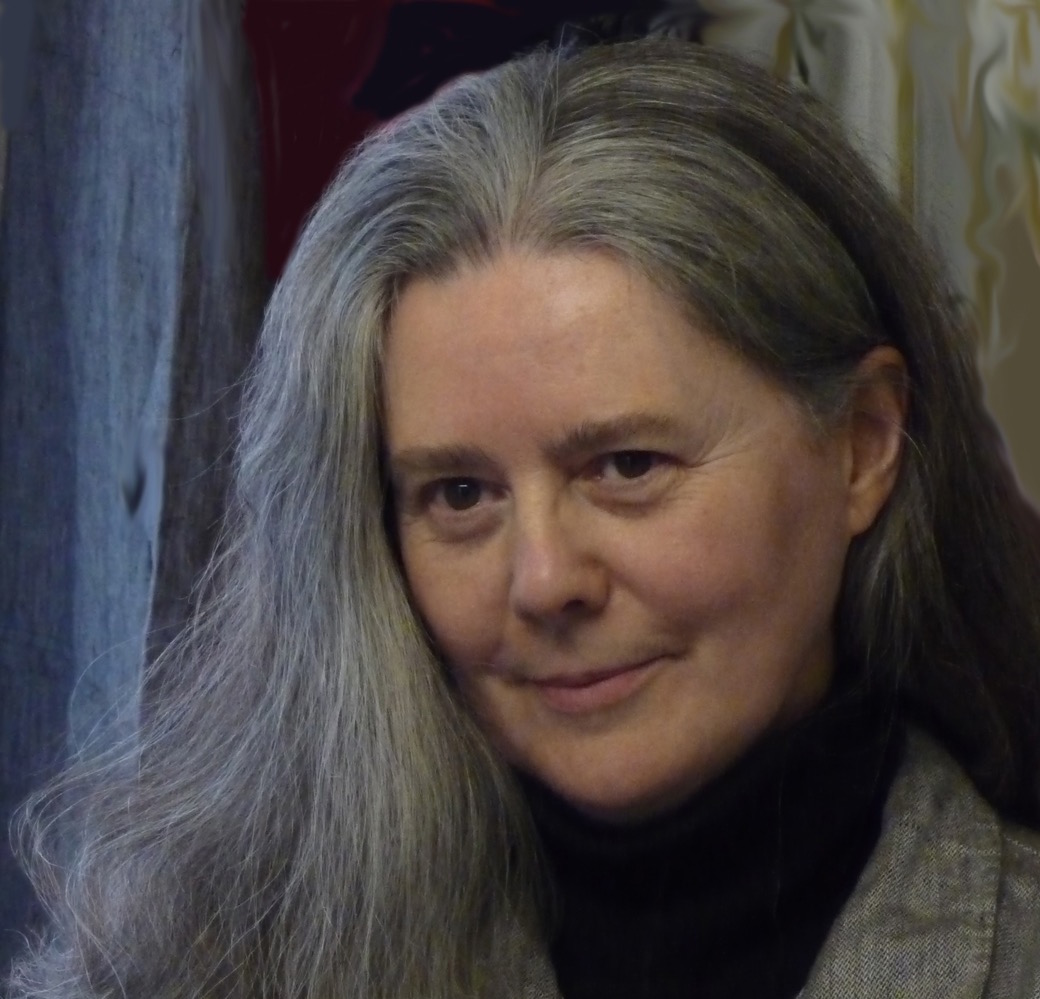A series in which Isabella is excited about everything that is happening at Growing Room 2019, so she sat down with some festival authors to hear about their work, and what events they are most excited to take part in.
A series in which Isabella is excited about everything that is happening at Growing Room 2019, so she sat down with some festival authors to hear about their work, and what events they are most excited to take part in. Learn more about the 2019 Growing Room festival by visiting our website, festival.roommagazine.com.
Susan Scott edited Body & Soul, Caitlin Press’s breakthrough book of spiritual memoir, and is the nonfiction editor with The New Quarterly (TNQ).
ROOM: Hello Susan, how are you? First of all, congratulations are due! The wonderful anthology that you edited, Body & Soul: Stories for Skeptics and Seekers, just came out with Caitlin Press this spring. How exciting is that? Let this be a space for you to take some time to reflect. Take us through the process. How has working with these contributors further shaped this project? And, how does it feel now that it’s out there?
SS: Isabella! So great to be talking to you!
Yes, the ingenious team at Caitlin Press did it! The publication date is March 8th, International Women’s Day. The timing could not be better.
Body & Soul is a collection of powerful, personal, authentic work by women poets and writers—a take-up-your-pen-and-write kind of book that’s rooted in the passion for truth-telling.
Spiritual lifestory is a passion of mine, especially the tension between the mysteries of the inner life and approaching the ineffable through language. You’re a poet, Isabella, you get that I’m sure. But I came to questions of tongue and spirit through family: my sister has the gift of second sight; I have the gift of language. Between us, we represent this classic dualism, or what’s seen as one—the inspired v the educated, the practitioner v the observer.
Can’t we be both? Isn’t that the human struggle for wholeness?
The idea for a book sprang from a panel on spiritual memoir I hosted at the 2015 Wild Writers Festival, in Waterloo, Ontario. Response to that session was tremendous, and it only seemed natural that The New Quarterly (TNQ) take another proactive step after the festival, which we did, by opening a new series. Soundings is for spiritual memoir with a literary bent—or literary essays with a spiritual bent, whichever you prefer. I began soliciting work with an eye to creating a volume of distinctive voices. I wanted to dedicate space to speaking openly, frankly. That “want” became a three-year odyssey resulting in the book, and in a deep commitment to carry on this kind of work.
Caitlin Press said yes to the volume, which was ideal. When GR invited us to launch the book here, we were over the moon.
ROOM: This anthology invites writers from marginalized or misunderstood communities to come and celebrate, to write and explore around faith, practice, religion and ceremony — important conversations that are often left out in our everyday conversations. Some of those writers, including Sharon Bala, Meharoona Ghani, Amanda Leduc and Betsy Warland, will be with us at the launch. Tell us more about their pieces. Go ahead and give them a heart-warming shoutout.
SS: Voices from the margins seldom get a hearing. Whereas mainline traditions have a canon, a body of literature and a following, there are countless lesser-known or blended traditions that tend to fall below the radar. Until recently, the same negligence or indifference has been true regarding Indigenous traditions: Canadians generally did not take the time to educate ourselves, or think we should.
Of course by margins I’m referencing the mainstream’s POV. I’m challenging the mainstream to look again, and again, and examine its indifference.
Betsy, Amanda, Sharon, Meharoona—like their counterparts in the volume, these writers are all leaders. Frontier women. Connection-makers. Women who can throw their voice. Their appearance is a signal—a yes, it’s okay to go public with your story.
I liken the process of building an anthology to the practice of hospitality—another old word that’s misunderstood. The roots of hospitality are linked to care. In the writing community, a hospitable publishing process begins and ends with care. Care, as in deep listening and holding the space for writers. Care, as in I care deeply about what you have to say and I believe in my bones that others will care. Care, as in judicious editing that builds on trust.
Care, as in, building a critical context in which the work is read.
As writers, we want our work to enter the cultural conversation, and what is context if not another word for home?
ROOM: I can see how that this anthology is like a dinner party. It will be even more so, don’t you think? Now that you will be going on tour in the next few months, and meeting some of those authors in person for the first time.
 SS: Picture setting the table for a couple of dozen guests and keeping the food hot for a year. That’s what it’s like, mounting an anthology. And, like a great dinner party, it is worth the wait.
SS: Picture setting the table for a couple of dozen guests and keeping the food hot for a year. That’s what it’s like, mounting an anthology. And, like a great dinner party, it is worth the wait.
After Vancouver we’ll be in Toronto, Montreal, then stateside in Appalachia and in northern Ontario. Come November, we’ll reprise the spiritual memoir panel at Wild Writers—and thus the call-out for a book will come full circle.
I’m coupling the book with a Year of Listening.
Each launch is a pause—for refreshment, and, as you say, reflection. The chance to connect in critique and celebration. The chance to push back at convention.
I want to hear what readers have to say. I want to hear how they respond to these fantastic writers.
Look, these writers took enormous risks, going public. They say so here, on the All Lit Up blog.
Let’s face it. There’s a lot of eyeball rolling when it comes spirituality, religion, faith—pick your word, they’re all words that make people uneasy. Real knowledge, understanding or empathy are often thin, and it’s no wonder. Canadians tend to keep such matters private, which is fine on the one hand; on the other hand, it means we lack a nuanced public discourse, a lexicon to reach for. This lack is creating real trouble. Look at the cultural values debacle in Quebec, for instance, about what constitutes a religious symbol.
Creative nonfiction isn’t a cure-all, but it is a start, a way of speaking to human experience—sexual, spiritual, psychedelic, somatic. If we master the craft, we can speak out about the fullness of our lives.
Language that’s alive, precise, embodied is essential to a just society.
In that sense, in a very real sense, Body & Soul is about peace and justice work that begins and ends with women’s voices.
ROOM: I’d love to hear about your own writing as well. You are currently working on your memoir, Sainted Dirt: Reckonings with Land, Language, Family & Imperfect Teaware. Your essay, “Sign Language,” was also published in the latest Fall/Winter 2019 issue of The Humber Lit Review. CONGRATULATIONS again!
SS: Thank you! Eufemia Fantetti, HLR’s editor, pried “Sign Language” out of my hands, then sent it on to the National Magazine Awards. It’s a transgressive piece, much like “Zion’s Children,” the piece I included in Body & Soul; both chapters are from Sainted Dirt.
The title, of course, is an oxymoron—a play on the mythic power of smallness.
“Sign Language” is a sister story—the firstborn fails her sister, who was born profoundly deaf. But the deaf sister’s also failed the family. So, where does fault lie, and what is failure? Who’s responsible for wholeness?
“Zion’s Children” is fundamentally about self-betrayal. I ran away from home, and eloped to an Appalachian commune. I was a utopian, a religious one at that, steeped in the mythology of the Latter Day Saint movement. The combination was heartbreaking; the lessons critical.
I don’t know about you, but I found that owning up to self-betrayal saved my life.
ROOM: Our history actually goes a while back. It’s been almost exactly a year since I met you for the first time in Waterloo. I told you about the West Coast and how excited I was to be volunteering with Growing Room for the first time. And here we are, both of us! You will be coming from out of town, is that right? Besides the festival, is there some other aspect of Vancouver that you have plans to visit? Any historic landmarks or scenery that would like to see?
SS: You, Ms. Wang, are one of those magical people who flew into my life via TNQ’s personal essay contest. I am honoured to be joining you at Growing Room—this is my first time at the festival, and, yes, I’ll be crossing the Continental Divide to finally all of you, as well as my publisher and the West Coast writers in the volume.
That’s a lot of firsts, isn’t it?
As for geography, it’s been 20+ years since I last sought solace by the ocean. I’m a Great Lakes girl, born near the mouth of a river. I have yet to understand salt water. Is this my chance, do you think?
ROOM: During the festival, you will be hosting the anthology launch for Body and Soul, and for our readers out there, another official launch will be held for the anthology on March 13th at the Vancouver Public Library, with more fantastic contributors from Vancouver. But tell me, what are some other events that you are most keen on attending during Growing Room 2019?
SS: First up, I want to meet my Room colleagues who have put on this phenomenal festival. TNQ editors morph into event planners for the Wild Writers Festival, so I know the joys and heartaches of this kind of work.
As for choosing, how to get it all in—that will be the challenge. Betsy Warland’s panel, with another of the book’s contributors, Meharoona Ghani, on poets writing about faith, is a must. Betsy was instrumental in the book finding a home with Vici Johnstone, at Caitlin Press. Betsy also introduced me to Meharoona. Anything I can do to support their work, I will.
All events featuring Sharon Bala, Amanda Leduc and Jonina Kirton are musts for me, even if these events are standing room only! I’ll also be meeting with TNQ writer/GR alumna, the inimitable Lori McNulty, and with one of my favourite Soundings writers, Dora Dueck. And I hope to see Alicia Elliott, again; she’s a TNQ consulting editor who’s had a profound effect on our festival.
Pam Johnson, a beloved contributor who’ll be making her debut at the Vancouver Public Library launch, on the 13th, wrote to say she’ll take me walking in the woods. I can hardly wait. It’s been a snow-smashed winter here in central Canada. I have forgotten what vegetation looks like.
ROOM: Thanks for taking the time to sit down with me, Susan. I’m so excited to have you for Growing Room 2019!














